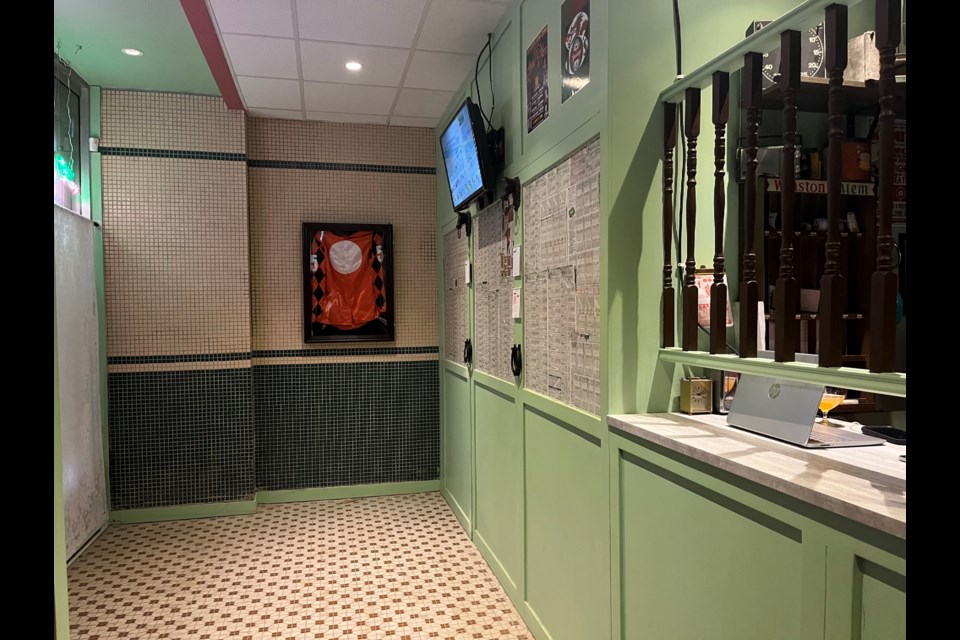You might question if you're in the right place.
At 518 Main St, wedged between a grocer and a gift shop, there's a black unmarked door separating the neon-lit streets of Chinatown from Vancouver's newest speakeasy, Bagheera. With the closure of Prohibition, only a handful of truly hidden bars remain in the city, and even fewer which require a password for entry.
"Hi, you here to bet on some horses?"
The fictional Happy Valley Turf Club doesn't appear on the map but stepping across the threshold it certainly feels real. Races from the Happy Valley racecourse in Hong Kong play on the TV, real paper betting slips cover the walls, as does a chalkboard of horse names and stats: Gunga Din 88/1, Shut Eye Sentry 16/1, and the horse we're here to bet on, King Louie 25/1.
King Louie is a reference to the playful (if slightly unsettling) orangutan from Disney's The Jungle Book based on the story collection by polarizing English writer Rudyard Kipling. The bar's name has the same source; Bagheera was the black panther who protected and raised the "man-cub" Mowgli.
Once the hidden doors to Bagheera's entrance open, there are no phones or cameras allowed inside.
The main space is modelled after a turn-of-the-century train car travelling through India and you'll see references to Kipling and The Jungle Book throughout the bar. The decor acknowledges the time period's colonial history while subtly undermining it for those paying close enough attention.
At first glance, all the patrons are reading the books and broadsheet newspapers, a clever way the Three Kingdoms Hospitality team has disguised the menu to keep up the charade.
Co-founders Lewis Hart and Brij Rathi, part of the crew behind the Shanghai-inspired Chinatown speakeasy Laowai, painstakingly developed Bagheera as an homage to the intersection of their heritages; Rahti is Indian, Hart is British and his grandfather was an ambassador to India.
Literature nerds will find plenty of references to geek out about (starting with the fully-readable newspaper menu). The interior is full of tiny details that reveal themselves the longer you look: the custom wallpaper on everything including the air vents, the curved ceiling adorned with jewellery pieces collected from markets in Delhi and Jaipur, and the animal finishes like tiger handles, and money light fixtures.
What drinks and snacks are on the menu at Bagheera?
The cocktails, developed by Alex Black, are named after Kipling's work and twist classic recipes with unexpected flavours. The menu runs the gamut from dark and spirit-forward (The Anvil) to dangerously sippable (The Yellowstone) with a specific gin and tonic list designed to surprise.
The humble gin and tonic is oft overlooked but Black's expertise teases the variety out of the classic cocktail and will continue to introduce seasonal drinks like a strawberry G+T he hints will be coming soon.
The bar snacks by Blnd Tger and Laowai executive chef Phong Vo consist of poppable pakoras (prawn, paneer, chicken, veggie) with dipping sauces, curries and daals like Saag Aloo Pave, Goan Tamarind Fish Curry, and Coconut Lamb Koftas with naan and rice add-ons.
Indian dishes are quintessential to a night out in the U.K. and haven't been embraced in the same way over here, explains Hart. The connection between India and the British Empire, while colonial, is inextricable and you don't need to celebrate it to acknowledge it.
Bar operators want to put their own spin on speakeasy culture
Hart acknowledges the pushback about gentrification that surrounded Laowai's opening but says that it hasn't impacted the turnout for their business, nor did the objections come from the surrounding community. However, it was something that they kept in mind while developing this new venture.
Speakeasies are part of Chinatown's history, Hart points out, and says they are uplifting it in their way. Bagheera was an empty, open space when they bought it, having previously been a souvenir shop that closed somewhere between September 2019 and December 2020.
"We're paying dividends as much as we can," says Hart. Wherever possible they source ingredients from the surrounding grocers and legacy businesses.
"The neighbours band together, we look after each other," he adds.
He also challenges people worried about gentrification to "follow up on it," saying "put your money where your mouth is."




